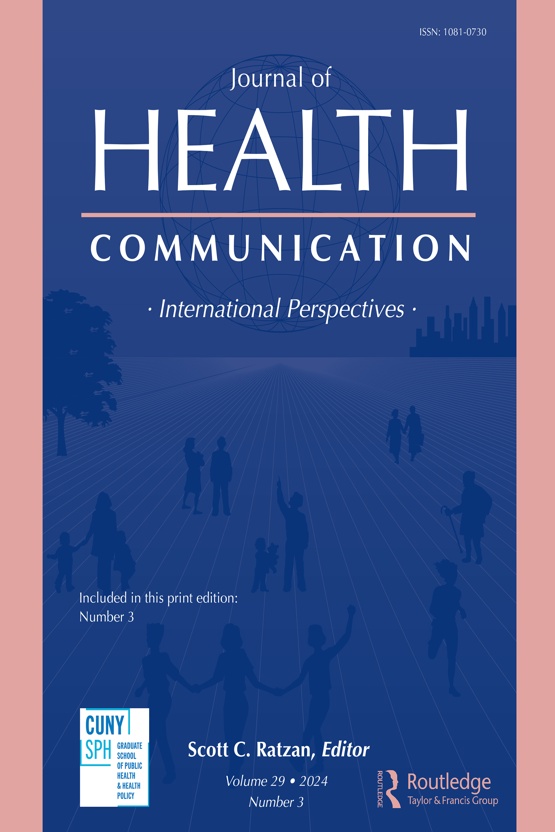Submit a Manuscript to the Journal
Journal of Health Communication
For a Special Issue on
Successes and Failures: Everything we learned from health communication campaigns and programs
Manuscript deadline
02 August 2024

Special Issue Editor(s)
Jennifer Bishop,
Director, Division of Health Promotion and Communication, Office of Health Promotion and Disease Prevention, US DHHS; SHC Steering Committee member
[email protected]
Ashani Johnson-Turbes,
Vice President, NORC at the University of Chicago; SHC President
[email protected]
Mike Mackert,
Professor, Director of the Center for Health Communication, Moody College of Communication, University of Texas at Austin; SHC Steering Committee member
[email protected]
Sung-Yeon Park,
Professor, Associate Dean, School of Public Health, University of Nevada, Reno; SHC Steering Committee member
[email protected]
Brian Southwell,
Lead Scientist for Public Understanding of Science, RTI International
[email protected]
Successes and Failures: Everything we learned from health communication campaigns and programs
In 2024, the Journal of Health Communication entered a partnership with the Society for Health Communication, an organization with 5,500+ individual members and 30+ organizational members encompassing health communication professionals, students, and scholars from diverse areas of teaching, research, and practice. With the partnership, the Journal serves as an official publication of the Society. The goal of the partnership is to increase the field’s access to critical health communication research, science, and practice learnings, to create new publication opportunities for Society members, and to advance public health. The partnership includes an annual special issue of the Journal.
The theme of this year’s special issue is “Successes and Failures: Everything we learned from health communication campaigns and programs.” Crafting this theme, we highlight our keen interest in learning from various experiences, not just successful ones. Publication bias, the tendency of journals to publish studies with statistically significant findings vis-à-vis studies reporting null findings, and the file drawer problem, the tendency of authors to withhold studies with null findings from submitting to journals in the first place, are well-documented phenomena and we do not assume that health communication scholarship is immune from it. A ClinicalTrials.gov requirement is one attempt to remedy the biases, but the enforcement mechanism may not apply to all health communication research activities.
In this call for researchers to dig into their file drawers – physical or virtual – we emphasize that null findings can be interesting when written well and could potentially make a significant contribution to our knowledge base. We are also looking for insights gained from the experiences that yielded unintended outcomes or presented unforeseen ethical challenges. Additionally, we encourage the submission of studies with innovative or otherwise robust evaluation components that did not yield desirable results. We are equally interested in the perspectives gleaned from unique collaborations and other unconventional planning, implementation, and evaluation components. Last but not least, we also welcome manuscripts reporting successful campaigns or health communication programs as long as they clearly document what could have gone wrong and/or how they avoided highly likely pitfalls that could have derailed their projects.
By taking the inclusive approach, we strive to expand the horizon of “high-quality health communication research” and the ranks of authors to practitioners, although no special preference will be given to the Society members as opposed to non-members. The transparency achieved in the process, in turn, could contribute to maintaining and restoring trust in health communication.
Suitable topics for this special issue include, but are not limited to, the following:
- Stories of unintended or unforeseen effects of campaigns
- Pre-testing that showed actual audiences preferred messages the internal team didn't expect or unexpected audience reactions to messages
- Gaps in traditional marketing segmentation that can hinder effective health communication
- Lessons learned from crisis communications efforts
The manuscripts can be research papers from various traditions, commentaries, perspectives, and others, as long as they meet the intellectual rigors expected for the articles in the Journal and contain insights applicable to a range of health communication research and practices.
Manuscript submission deadline: August 2, 2024, 11:59 pm ET
Looking to Publish your Research?
Find out how to publish your research open access with Taylor & Francis Group.
Choose open accessSubmission Instructions
All submissions should follow the regular instructions for authors as detailed on the Journal’s homepage, with the stipulation that some articles such as commentaries could be shorter than full-length research articles. Select the special issue title “Successes and Failures: Everything we learned from health communication campaigns and programs” when submitting your paper to the submission portal. All submissions will undergo peer review through the online submission system.